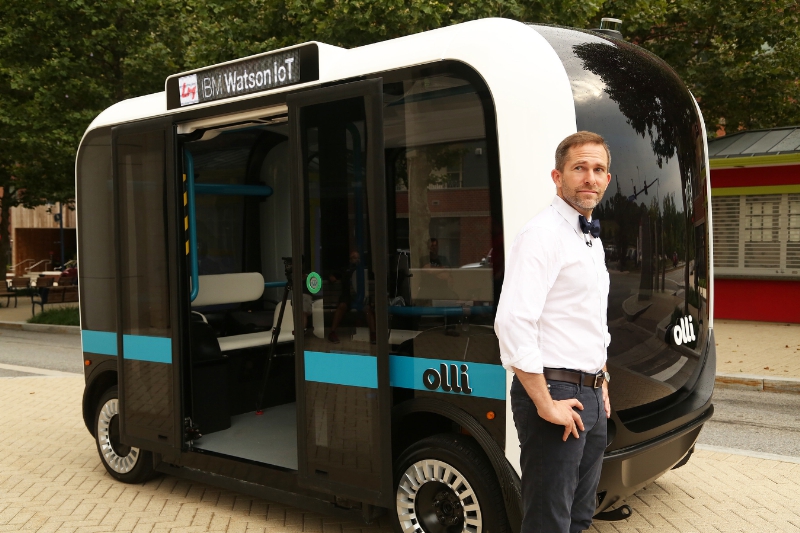Meet Olli: the 3D-printed autonomous bus of the future
Local Motors unveils crowd-sourced mass transportation vehicle in D.C.

Sign up for breaking news, reviews, opinion, top tech deals, and more.
You are now subscribed
Your newsletter sign-up was successful
Denizens of Washington, D.C. will see a new mode of transportation near the nation's capital this summer: a 3D-printed, autonomous bus.
Olli is a partially-recyclable, autonomous electric shuttle created by Local Motors, based out of Arizona. It utilizes IBM's Watson cognitive learning software called the Watson Internet of Things (IoT) for Automotive, a successor to the system initially designed to play Jeopardy! (and won in 2011, when it beat two of the show's champions).
Newer versions of Watson's cognitive learning software has been applied to the automotive realm creating the autonomous vehicle platform of the future. The system will be able to take input from any language, translate it, take users to their destinations, and even learn user's habits.
"We do everything through voice and we translate language and combine it with other data," said Bret Greenstein, vice president of IBM IoT. "We'll try to build as much of the experience and let the vehicle know about you so it can build your experience — favorite restaurant, what dry cleaner you use. There's things you can define in a profile, or things you can learn as you go."
Local Motors held a contest to design the shared transportation vehicle of tomorrow and Olli was the winning design, created by Edgar Sarmiento. Local Motors then utilised the Watson developer APIs, including natural language classifier, entity extraction, speech to text and text to speech systems, to give users of Olli a seamless interaction experience.
"I tried to make this vehicle flexible to a lot of things," Sarmiento said. "This one is a public solution for cities. It's simple, minimalistic, to make a shape like a box, and all of this related to the use of the product. It's a context to start to think of problems in the city as far as transportation and to think of solutions."
Olli's solution comes by way of small-sized, local transportation that will even have conversations with passengers about how the vehicle works, where it's going, how the vehicle makes its driving decisions, and answer the most necessary question of them all, "are we there yet?"
Sign up for breaking news, reviews, opinion, top tech deals, and more.
Microfactories near the location of intended use will be able to print cars in hours, with technicians inserting equipment ordered by the end user, whether these low-cost solutions are personally owned or publicly shared modes of transportation.
"The Strati is the idea of what does a $5,000 car look like? And an Olli is, what does it mean to share [a car]? The future is full of both," said Local Motors CEO and co-founder John B. Rogers, Jr. "In the future, it is shared transportation that is organizationally owned, there will be shared transportation that is privately owned, and then there will be transportation that is not shared that is privately owned. We'll have all these."
While Olli won't be driving the actual roads of Washington, D.C. quite yet, it will tour the National Harbor campus this summer, about 10 miles away from the capital. Las Vegas and Miami-Dade officials are also interested in the Olli autonomous bus to enhance municipal fleets.
"Improving the sustainability of local transportation networks as part of a wider goal to create more vibrant, livable, sustainable cities within Miami-Dade County, and improve the quality of life for residents is our top priority," said Miami-Dade County Mayor Carlos Gimenez. "We must do more to improve transit and mobility in our community and the deployment of autonomous vehicles is a big step in the right direction."
On top of Olli, Local Motors has also created the nearly $100,000 Rally-Fighter which will star in the upcoming Fast 8 movie and a $5,000 3D-printed POV called the Strati.
- EVs explained: everything you need to know about electric vehicles